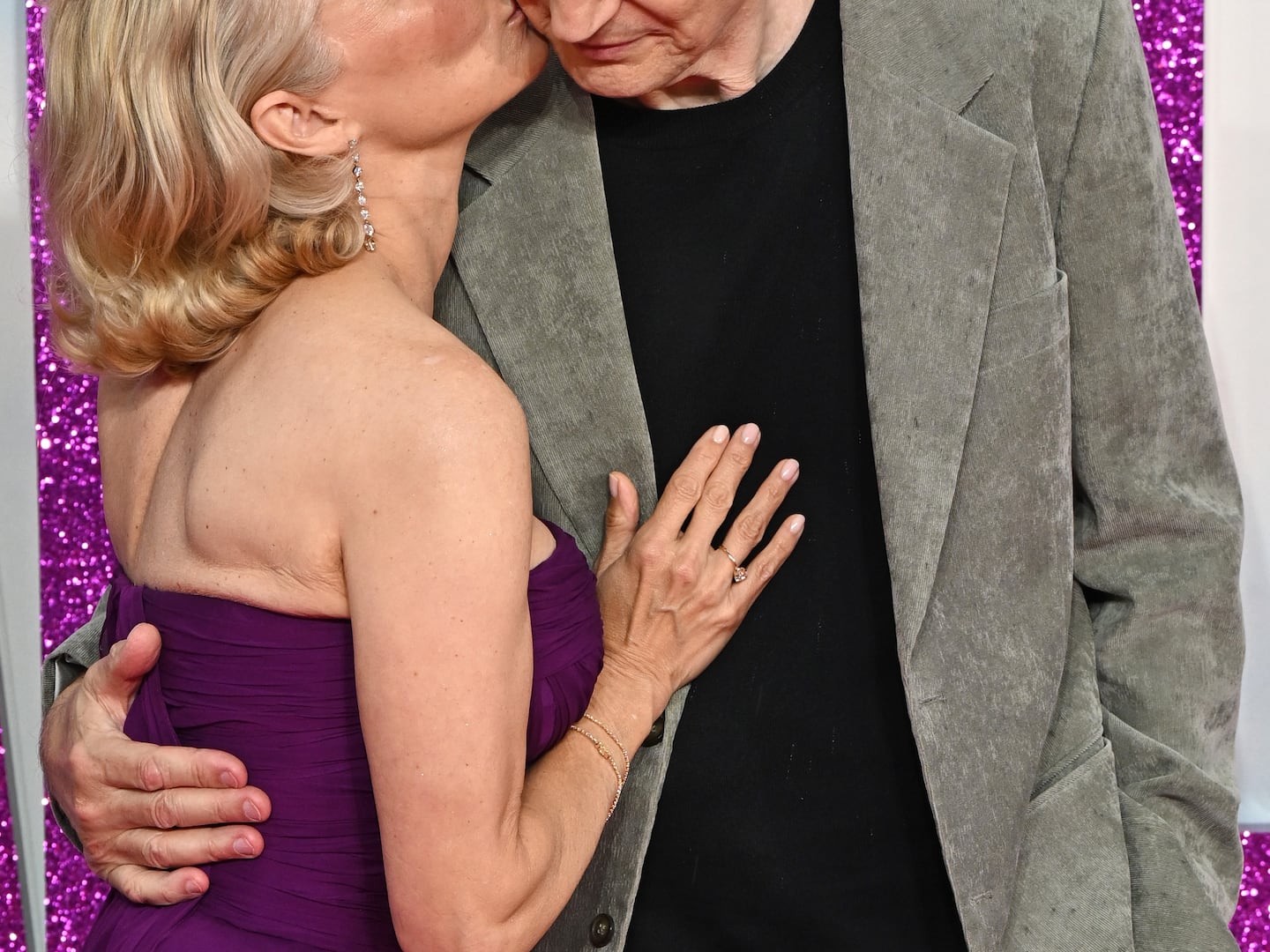Natasha Rothwell can be a bit defensive when it comes to her character on The White Lotus. The actress, who just scored her second Emmy nomination for the hit HBO show, may have struggled at first to understand why Belinda did what she did at the end of Season 3. But she also believes she “deserves” what comes to her and gets why she ultimately decided to “f--- the morality.”
In her return to The Last Laugh podcast, Rothwell opens up about how she used her own past struggles with money to relate to her character on the show. As a former SNL writer herself, she reacts to the “White Potus” sketch that caused an uproar and frustrated her castmate Aimee Lou Wood. Rothwell also discusses how another co-star, Jason Isaacs, helped fuel rumors about real-life drama between cast members, reflects on the disappointing cancellation of her Hulu show How to Die Alone, and explains why she has spent nearly a decade tweeting “you are trash” at Donald Trump every single day.
Three years ago, when Rothwell was Emmy-nominated for Season 1 of The White Lotus, she ended up losing the award to her scene-stealing scene partner Jennifer Coolidge. This time, she’s up against three more co-stars: Carrie Coon, Aimee Lou Wood, and Parker Posey. But no matter what happens at the award show in September, Rothwell feels like she’s “already won” just by being asked to reprise the role of Belinda by the show’s creator Mike White.
“I said goodbye to Belinda,” she says now. “I was just like, what a great opportunity, and I saw it in my rear view mirror. And so when the opportunity came back again, I was so overjoyed.” Rothwell said yes to returning to The White Lotus world without seeing so much as a page of the script.

Once she did get her hands on those script pages, the word that kept coming into her mind as she saw what Belinda was getting up to in Thailand was “resilient.”
Coolidge’s character Tanya leaves her high and dry at the end of the Hawaii first season after promising to help her open her own spa. But by Season 3, Belinda is back on her feet and enjoying a rare bit of luxury during a cultural exchange program at the Thailand resort—complete with a full-on love interest named Pornchai. That is, until the events of Season 2 start to catch up to her in the form of Tanya’s murderous ex Greg, who now goes by Gary.
“She’s tough, you know?” Rothwell says of Belinda. “She knows that there’s more to life. And so I think to see her yearn to grow, it’s a beautiful thing. Her light was dimmed so acutely at the end of Season 1. So to see it back on again, it lit me up reading it. I was like, OK, let’s go!”
Warning: Spoilers for Season 3 of The White Lotus ahead.
Below is an edited excerpt from our conversation. You can listen to the whole thing by following The Last Laugh on Apple Podcasts, Spotify, or wherever you get your podcasts, and be the first to hear new episodes when they are released every Wednesday.
Belinda’s decision at the end to ultimately take the money and run was pretty controversial in some ways. And I will say, you had me fooled. When she walked out of that negotiation, I believed it. And then of course, we get the turn where it’s all ruse and you’re in on it. Is that true that that was your idea?
Originally, it was just Nicholas Duvernay, who plays my son Zion, they were in the negotiation themselves. And I talked to Mike [White] and was just like, I want to see her have some agency. I think she outsourced so much of her power in Season 1 to Tanya, and I just don’t want her not to exercise it this season. So I pitched her running the negotiation. So he went back to the drawing board and came back with the scene that is so beyond what I could have even pitched, which is why he’s Mike and I’m not. And I was so grateful because you get to see her in that moment play upon people’s perception of her that she’s weak, that she’s feeble, that she’s scared of Greg and scared of change. And we see that in that moment, she’s actually in charge and she’s manipulating, and she can see his weakness. How often does a brown woman have power over a billionaire white man? It’s one of my favorite moments of the show this season.

So the narrative around the end of the show with Belinda was that she’s sort of become this mini version of Tanya, doing her love interest Pornchai dirty, the way that Tanya did Belinda. I’ve even seen people put the two scenes back-to-back online. How do you respond to that? Because I know you don’t feel like it’s as cut and dry of a parallel of the end of Season 1, right?
No. I think that is also the genius of Mike. It’s an echo, right? So you can see the DNA of the dynamics that Belinda had with Tanya. But I think Tanya promised Belinda the world, like, we’re gonna do this together. And I think Belinda never gave that to Pornchai. She was like, I’ll think about it. And it was in the hypothetical realm and nothing that was tangible. But I think that Pornchai took it as something that was tangible, that was tantamount to a promise. And so especially after them sleeping together, I think he was just like, oh, we’re in it to win it. And I think Belinda was in this place of just following her heart and feeling like she was just very in the moment. And yeah, I’ve seen the side-by-sides, and OK, I hear you. I understand that they are similar, but they’re not identical. I think that they live in a space where you get to see someone handle the same situation with compassion. Belinda goes to Pornchai and says, circumstances have changed. It’s not a no, but it’s not right now. I have to understand what this new chapter means. So I understand it, but I’ll fight for her.
It also goes back to the perception of who this person is as a character, too. Even the fact that she takes the money, I think people were uncomfortable with.
I was!
They think of her as the moral center of the show. How did you figure out for yourself how to be OK with that or find a way to understand her decision? Was that hard for you?
Very much so. She’s such a moral compass for the show. And I think in the Venn diagram of Belinda and myself—I fancy myself as someone who’s also pretty moral and does not want to invite that karmic retribution into my life. But I also think that you find her in a place where she’s justified it mentally in that this is something that was promised to her, but also it is someone offering relief to a lifetime of struggle. I just remember in my twenties in New York where I was so broke, picking up Metro cards off the ground, hoping one of them had enough to get me home from a comedy show and thinking, there will never be a point in my life where I’m not thinking about money, where I’m not thinking about how to pay the bills, where I’m not thinking about like how to pay the rent. And to give someone in that position that kind of breath of fresh air, it’s hard for her to reconcile saying no to that freedom. She deserves it. She thinks about the emotional tax that she’s paid just by existing as a Black woman in America and working in a subservient position in a mostly white homogenous environment with people who have triple, quadruple the money she has. It’s one of those things where it’s just like, f--- the morality, I deserve to have this break. And so, I’m worried about her, if I’m being honest, because I do think that there is some sort of karmic retribution coming. It’s bad money, it’s blood money. So I don’t know what future seasons hold. I don’t even truly know what’s going to happen with Belinda in the series, but you worry about someone that tastes the forbidden fruit. She dives into the deep end with everyone else. And I like that we get to see her break bad a little bit. She’s human after all.

What would you want to see for her if you did come back once again, whether it’s the next season or maybe in two seasons, or down the line?
I mean, I think that she’s the type of woman that, given the origins of her newfound wealth, I think she will feel compelled to do good with it. I don’t think it’s necessarily a spa treatment center. I think that was the kind of dream she had to have, because it was maybe practical, like I’ll start a business and make money. And I do think that there’s this unresolved justice with Tanya. Belinda’s the strongest tie to Tanya. And I don’t know if there’s an opportunity for her to bring justice to that situation, but perhaps.
I’m not suggesting that you’ve ever taken blood money in your career, but you did say that when you were starting out, you couldn’t imagine ever not thinking about money. Was there some decision or some moment in your career that made it so that you could get over that hump the way that Belinda is now?
Yeah, when I got SNL, that was my first real, steady paycheck from anywhere, for my craft. And I chipped away at my college debt. I was scraping by so barely when I was in New York, so I am very frugal. There’s this mindset of lack that can be ingrained in your brain when you haven’t had a lot. I just remember getting my first couple of paychecks from SNL and some of my counterparts were doing more fun things, and I was just like, no, I’m paying down my student loans.
And I can’t imagine as a first-year writer on SNL that those are huge paychecks either.
No, not at all. I was just digging myself out of a massive hole. But it did give me the exhale of like, oh, I know my rent is going to be paid next month.
I was curious, as someone who got their first big break writing for SNL, what you thought of The White Lotus sketch that got quite a lot of attention when it aired this past season?
It’s so fascinating. because I’ve seen how the sausage is made. So I think there’s some care and attention that could have been paid to Aimee Lou’ portrayal. Also just knowing her, her heart is just so big and she wears it on her sleeve, and so I feel a little protective of her. Overall, everything’s in jest there, but it’s intent versus effect, right? It may have been intended to be lighthearted, but some people maybe got in their feelings about it. I mean, I chuckled.

The concept of the sketch was really going after Trump and MAGA and using White Lotus as a vehicle for that. But then I think when it came to Aimee Lou’s character, that piece was maybe missing a little bit or there wasn’t a clear satirical target there.
Yeah, it was a complicated execution to be sure. And it’s a complicated show. And then to add the politics on top of it, it was a hard needle to thread.
And of course you got to watch Lizzo portray a version of Belinda. What did you think about that?
I wanted her to have more! It was so quick. But yeah, it was a very full circle moment to have been on that show and then, 10 years later, have someone play me on the show. Life is wild, man.
The cultural impact of The White Lotus is just enormous and even more so than when you were on the first season. What has that been like for you? I mean, people are bizarrely fascinated with on-set drama between the actors that may or may not exist. A lot of that stuff, to me, feels kind of invented.
Truly invented. I mean, the fandom is so intense and people want to know what’s going on in our lives and who hates who. And I hate to disappoint people, because I’m just like, no, we really did all get along. People are taking photos and extrapolating all of these theories. And I’m just like, we’re just people who got to be in this cool production and made something that you like, can’t it just be that? And they’re like, no, we need the drama!

People want it to be a reality show.
Yeah, people want that. They want the soap. They want it to feel as soapy as Mike writes, but I’m just like, no, it’s not that way. You know, Carrie Coon told me about a really good bug spray. And Walton [Goggins] and I chopped it up over some brown liquor and laughed. There’s no drama. But I think that what I love about The White Lotus is that it is this kind of fantasy people can project onto and escape into. So people who come up to me, I love it because luckily I don’t play a character people hate, they’re just like, “Oh my god, I’m so excited for you!” So it’s been a joy, but the drama is so… don’t trust it. I wish I could tell the fans of the show more about how it’s really dirty, but it’s not.
To be fair, I think Jason Isaacs fueled that a little bit by alluding to something and then that really took off.
Oh, Jason. He’s so funny and he’s so very British. I also think it’s just like—how do I say this? People can work together and be professional and get along, but it doesn’t mean that we’re going to be in each other’s Christmas cards, right? And so I think that was his way of expressing that. But I remember reading it too and being like, Jason, man, people are gonna take this and run! He’s so sarcastic and dry.

It does feel like The White Lotus has elevated the careers of anyone who has been in it. Do you feel that? Are there things that it has allowed you to do that you couldn’t have before?
I don’t know if I can suss out the cause and effect. I think it’s a net positive to be sure, but I think it still remains to be seen. Ask me this question a year from now and I can tell you what impact it’s had. But again, it’s a great club to be in. And I feel so fortunate to have gotten in on the ground floor. I don’t know if I would’ve been cast this time around. The first time I didn’t even audition. I just got on a Zoom with Mike and he was like, “Do you wanna play Belinda?” Now you have the likes of Jason Isaacs putting himself on tape, you know? So yeah, I think my feet are firmly planted on the ground because of my entry point into the franchise. And now, for the first time, I’m really experiencing the phenomenon that is the show. So we’ll see.
Listen to the episode now and follow The Last Laugh on Apple Podcasts, Spotify, or wherever you get your podcasts to be the first to hear new episodes when they are released every Wednesday.






